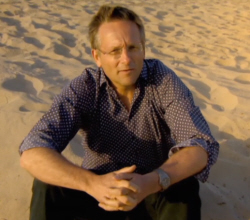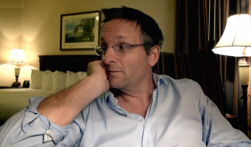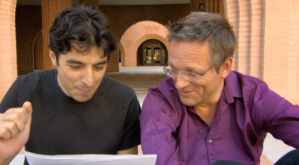Fasting - Reduce IGF-1
Reducing Age-Related Disease Risk Factors
Horizon - Eat, Fast and Live Longer
But what's the link to calorie restriction in humans? Valter has lined up a very simple, very Californian analogy. It turns out there is something in
the food we eat that affects how much IGF-1 our bodies produce.. That something is protein. When we eat a lot of protein, our cells get locked in go-go mode.

Valter's Ferrari
So it's basically like slamming your foot on the accelerator, saying, "Go! Go! Go!" Is that right?
Professor Longo "Exactly, It's pushing the cells to burn fuel."
In go-go mode, the body is more susceptible to some cancers and diabetes, because your cells are growing too fast for damage to be efficiently repaired.
Professor Longo "So it's like driving your car all the time and never taking it to the mechanic."
Right, so that's the key, basically, is to somehow find a way to switch your body from going, "Broom, broom, broom" into a sort of repair mode,
"Look after me, make my DNA better."
Professor Longo "Exactly."

Professor Valter Longo
So, how do you reduce your IGF-1? Well, studies on calorie restrictors suggests that eating less helps, but it's not enough. As well as
cutting calories, you have to cut your protein intake. Not entirely – that would be a very bad idea. It's about sticking to recommended
guidelines, something most of us fail to do. And you don't have to be a CRonie to lower IGF-I.
There is another way – fasting.
Professor Longo "In fasting, there is a much more dramatic and much quicker response, and so, within 24 hours, you decrease your glucose level
and you decrease your main growth factor, which is IGF-I."
I do find it hard to believe that just a few days of fasting is going to be enough to jolt my body into a more healthy state. But I'm certainly
intrigued, and I want to find out more.
So I've had my IGF measured back in London, and they tell me that it's 28. Is that good? Bad?
Professor Longo "That's not very bad, but that's high enough that, based on a number of studies, including our own, it peeps you in a higher
risk category for several different cancers, including prostate cancer."

Michael Mosley Deliberating
Valter believes I should start to see some pretty impressive results after just three days and four nights of fasting. But it's a daunting
prospect. I think fasting is quite tough, isn't it? Have you done it yourself?
Professor Longo "I've done it myself, yes, I fasted for four days several times and to me it was very tough, yeah. And still, if I look ahead
at doing fasting, I see it as a tough four days, I'm not looking forward to. Some people do, but I don't. I'm Italian, so I look forward to
eating well, you know."
I'll bear that image in mind. The greedy Italian stopping eating when I'm feeling weak about it.
Prolonged fasting can be dangerous and Valter thinks it should only be undertaken by people in good health and preferably under close
supervision. So he will be keeping an eye on me.
OK, I've decided I'm going to try this fast, which is going to be a three-and-a-half-day fast and all I'm going to have lots of water, black
tea and one 50-calorie Cup-a-Soup a day. Now… Oh, God, I have never done anything quite like this before, so I imagine it's going to be really
tough. But I'm interested. And also, I must admit, quite concerned about some of the rather bad news, health news
I've been getting recently, so, it'll be a challenge, but I'm sure I'll manage it.
And so, my fast begins.

Michael Hungry
Right. It is now 10:30 at night and I am hungry. It has been just about 25 hours since I last ate a meal and the prospect of going to bed while
hungry is not a great one.
I think it's getting to me, because last night I had a dream and I dreamt I ate a sandwich and then I felt fantastically guilty. So vivid,
I had a look round to see if there were any crumbs on the bed, but there weren't.
Just as Valter warned me, the first day was tough. Not really because I was that hungry, but simply because I had never done anything like
this before. It was fear of the unknown. By nightfall, I'm beginning to think this is a very bad idea… Particularly when I had dinner with the crew.
Or rather, when they had dinner. So, yeah, here I am in a nice old Korean restaurant with the rest of the crew. And they are currently digging
in… It's a good smell. A really, really wouldn't mind a little bite. I do feel very hungry. Fortunately, my dinner is waiting for me in my hotel room.
I had to leave, I couldn't bear it any longer. My delicious miso soup here.
OK, final full day of fasting. Delicious breakfast here, black tea. I'm feeling a bit light-headed but otherwise actually all right.
I've learnt that hunger does not build and build, but comes in waves that pass. By now, I have depleted my body's stored glucose and will have
switched to burning fat for fuel instead. And Valter is right, my liver should also have stopped producing so much IGF-1, putting my cells
into repair mode.
Finally, it's 7 AM, day four, I'm getting my blood test done. So, after this, I can go and have breakfast? The first food for three-and-a-half days,
the first food for 86 hours.
The fast is over. Later that afternoon, a meet up with Valter to find out if it's all been worthwhile.

Valter and Michael
Professor Longo "So, the insulin-like growth factor one, IGF-I, this is the normal value. The bad news, you're almost at the top of the normal
range. For American standards, you're doing good. And the good news is, with your fasting diet, you dropped to almost half. It's a very dramatic
drop, so you respond very well."
Halving my IGF-I should cut my risk of certain cancers, like prostate cancer, which my father had. My blood sugar has also dropped to healthy
levels, which I'm really pleased about.
Professor Longo "I challenge you, in four days, to get more extreme metabolic changes than these with anything you want."
But Valter says, unless I switch to a lower protein, more plant-based diet, the effects won't last. I'll also need to fast once every
couple of months, to maintain the benefits. Can I really see myself doing that?
Professor Longo "You have to make a decision now, in your case, what you want to do, you know? And there is a lot of drugs that you could be
taking, and is that what you want to do? And if you do so, in a few years, or in a number of years, you're going to be the typical 65-year-old
in Europe that takes eight drugs a day, and so that's the option."
That is really, really impressive, that in just three and a half days, if this data is right, and the animal data is right, I have massively
decreased my risk of a whole range of age-related diseases. The big question in my mind at the moment is, can I do fasting once a month, for
however long it takes? Or is there a better way, a different way, a more manageable way out there, that can do much of what this does, but
perhaps with a little less pain?




